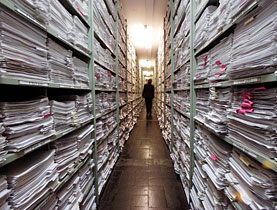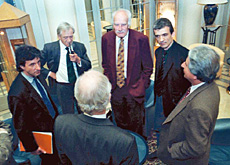ICRC Holocaust archives open to public

More than 60 years after the end of the Second World War, the Swiss-led International Committee of the Red Cross (ICRC) has opened up its archives on the Holocaust.
The Nazis kept meticulous records of their activities, including the movement of prisoners, the exploitation of slave labour and the horrific experiments they carried out on living people. The more than 50 million pages are kept in files stretching for 25 kilometres.
The Allied forces started to collect the documents even before the war ended. The archive, which is kept in the German spa town of Bad Arolsen, is governed by an 11-member international commission and administered on their behalf by the International Tracing Service (ITS) of the ICRC.
Until now the documents have been used mainly to help trace missing persons or to provide information in support of compensation claims. On the whole, only archive staff members have been able to see the originals.
“The documents are very old and of course they are brittle,” ITS spokesperson Iris Möker told swissinfo, which is why they have not normally been shown to outsiders.
But she admitted that it had sometimes taken a long time to answer queries from Holocaust survivors and family members, although such people had always had the right to ask for information.
The US State Department has been at the forefront of a growing move in recent years to open up the archives to a broader public. The decision to do this was taken in May 2006, but it could not be implemented until all 11 members of the international commission had ratified it. The last member, Greece, did so officially on Wednesday.
But even before this, the ITS had taken advantage of the advent of computer technology to start making the documents more easily accessible. Over the last ten years 70 per cent of the documents have been digitalised – in itself a huge undertaking.
“It’s a very time-consuming task because the documents have to be handled so carefully. They must be taken out by hand, scanned very carefully and carefully replaced,” Möker explained.
The result of the digitalisation is that researchers visiting the centre are now given a computer terminal to work on which gives them access to about 30 million pages.
Challenges
Nevertheless the conditions are not ideal: until now the archives have been used for humanitarian purposes and are arranged to make it easy to search for individuals. The needs of historical researchers are different, and this poses a major problem.
“If we are to completely restructure the archive according to archival principles, we can only do so once we have had a debate about its future. We have to think about whether it is to become a public archive, about where it is going,” Möker said.
Meanwhile, requests from historians are coming in from around the world. It is expected that the opening of the archives may stir new interest in the period.
And that is something that ICRC president Jakob Kellenberger would welcome.
“This dark chapter in German history must never be forgotten,” he said, when the opening of the archives was announced.
swissinfo, Julia Slater

More
International Committee of the Red Cross
The International Tracing Service is under the supervision of an international commission and is managed by the ICRC.
The commission members come from 11 states: Belgium, France, Germany, Greece, Israel, Italy, Luxembourg, the Netherlands, Poland, Britain and the United States.
The ICRC appoints a Swiss citizen as director.
The service not only helps to find missing people, but has also been used to validate compensation claims.
After Germany and German industries agreed in 2000 to pay indemnities for forced labour, the service handled 190,000 inquiries within 18 months.
The mandate of the ICRC includes searching for persons missing in situations of armed conflict or internal violence.
Today the ICRC is helping to search for missing persons in many parts of the world.
In 2006 the UN General Assembly adopted a Convention on Enforced Disappearances.
No definitive figures are available for the total number of missing persons, but it is thought that hundreds of thousands are involved.

In compliance with the JTI standards
More: SWI swissinfo.ch certified by the Journalism Trust Initiative











You can find an overview of ongoing debates with our journalists here . Please join us!
If you want to start a conversation about a topic raised in this article or want to report factual errors, email us at english@swissinfo.ch.